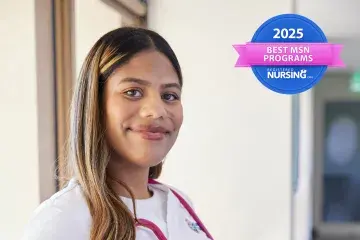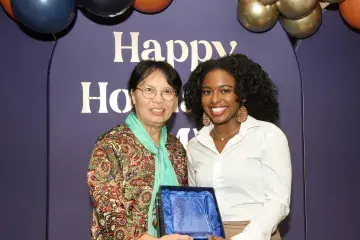What Are the Benefits of an RN to BSN Degree?

Nurse managers are in high demand, and many RNs are pursuing a bachelor of science in nursing (BSN) degree with an eye toward moving into leadership positions. Others are pursuing a BSN to increase their earning potential, expand their career opportunities, and keep up with changing job responsibilities.
Nursing today is data driven. It involves scientific technologies and discoveries that profoundly impact how care is delivered. Remote monitoring, for example, makes it possible to send people home with wearable devices. Telemedicine and informatics are crucial components of quality patient care. Clinicians need to understand how data is gathered and analyzed to inform care delivery and improve health outcomes.
“The RN to BSN program at Samuel Merritt will give you new skill sets that allow you to deliver empathetic, compassionate care in a very high-tech world and still get back to the core principles of the art of nursing,” says Professor Alice Vestergaard, the program’s regional coordinator.
Here, Vestergaard explains what makes SMU’s RN to BSN program so special.
How is SMU’s RN to BSN program different from others?
There are so many things that make our program special, but I’ll just start by saying that very few, if any other, RN to BSN programs have the legacy Samuel Merritt has as a not-for-profit health professions university, particularly in the area of nursing. SMU started educating nurses in 1909 and remains highly regarded for its nursing programs. That’s a real key differentiator between us and everybody else.
What does this program provide that other RN to BSN programs can’t?
For one thing, our curriculum aligns with the National Academy of Medicine Quadruple Aim, which emphasizes nurses’ wellness. Self-care is fully integrated into our curriculum.
We focus on nurses knowing and connecting to their 'why,' and we aim to foster resilience and agility in times of chaos and disruption. We offer courses you won’t find anywhere else. These include a mindfulness-based stress reduction course as well as a Humanities and the Human Condition course, which focuses on nursing in the contemporary context—how you show up for your patients, your coworkers, yourself, and your organization in the 21st century landscape of healthcare.
We emphasize the development of clear and effective communication with a humanistic focus so our scholars can confidently serve in a multi-professional collaborative environment and transform healthcare in important ways.
How much time will I need to spend studying per week?
You’ll need to spend approximately 20 to 25 hours studying per week, in addition to class time.
What’s the course format? Is it in-person or online?
Our program is a 20-month online program that takes place over five semesters. Some of the courses are asynchronous, so you can do them on your own time. Others, you’ll need to log in during a specific time.
I work full-time. Is there flexibility based on my schedule?
The program is designed to integrate into the daily lives of working nurses. Classes are offered on different days of the week and at different times to account for the 24-hour cycle of nurses’ schedules. Whatever your schedule is, we have a day for you and a shift for you.
How many clinical courses are required, and do I choose where I fulfill my clinical hours?
There’s one clinical course taken during the fourth term. It involves 90 clinical hours in addition to your academic core work. You’ll work with a community organization under the supervision of a faculty member. There is flexibility in the type of organization you work with and how you complete those hours.
What resources and support does SMU offer students?
We offer free tutoring 24-hours a day, 7 days a week. If you need help with a paper or study skills at 3 a.m., we have a tutor that can meet with you live. Students also have access to helpful video libraries.
How does the RN to BSN program help to transform healthcare through diversity and inclusion?
It would be unconscionable to offer a degree that did not represent the world we live in. Our curriculum delves into the actual structure of healthcare delivery, because, in order to change it, you have to have an awareness of what's wrong with it and how it's structured. We look closely at the inequities in society, and the impact they have on people’s access to or relationships with available healthcare. These are all issues that are integrated into the curriculum because they represent the landscape of healthcare in the 21st century.


